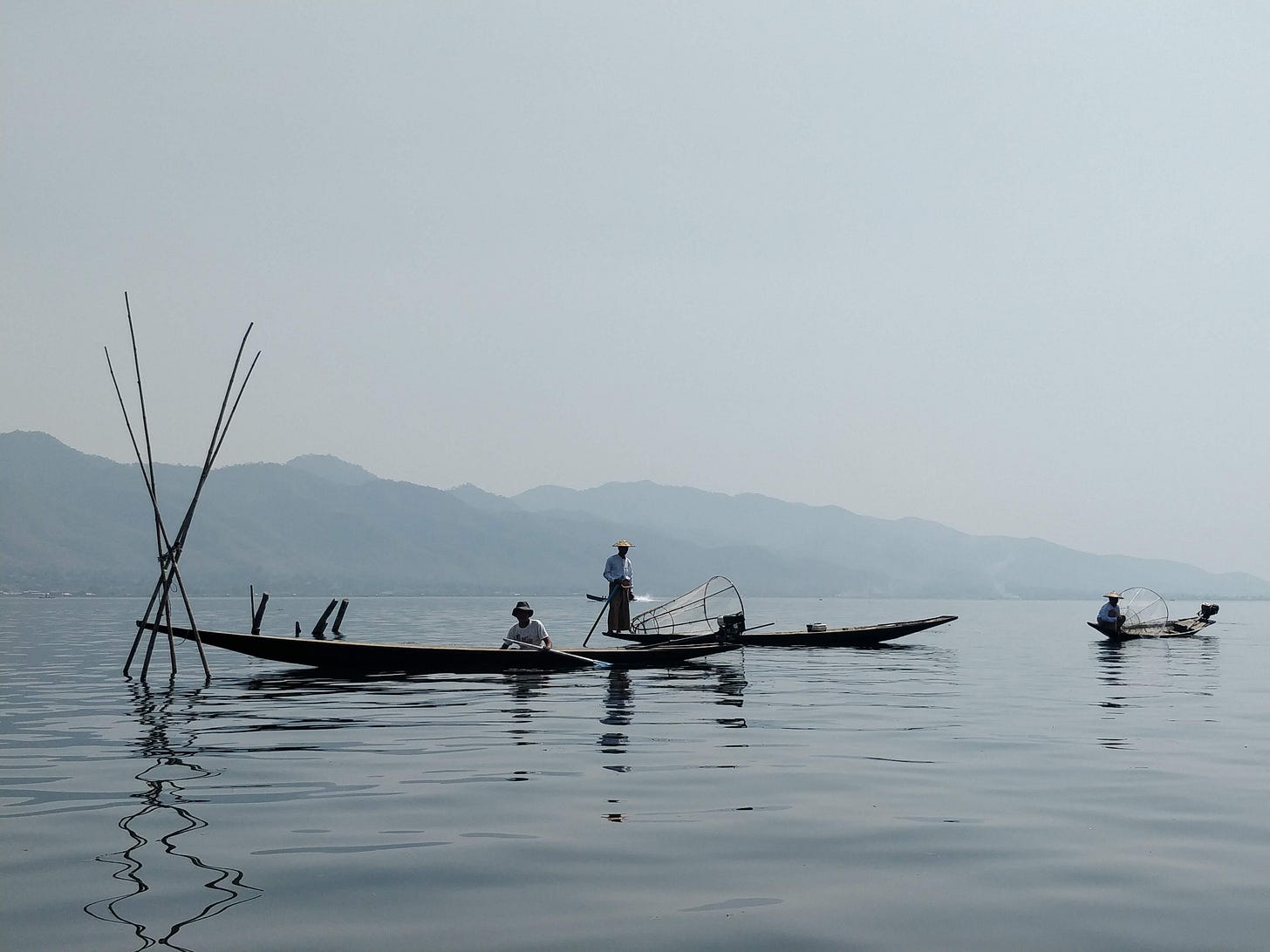A COP-out?
A newsletter about food systems, climate change and everything connected to them
Trigger Warning - there is a fair bit of jargon in this week’s newsletter. I find it impossible to avoid when talking about COP so apologies in advance!
There are many people who are doing a much better job than me on what the heck’s going on at COP26 - the 26th edition of the Conference of the Parties to the UN Framework Convention on Climate Change - so I’m not even going to try. I’m going to just continue what I’ve been doing - pick up bits and pieces that interests me and that I hope you find interesting too.
On The Fence
It all started with a little Facebook on Sept 10 post by Myanmar’s Ministry of Foreign Affairs (see below), announcing that the environment ministry and the interim Chargé d’Affaires at Myanmar Embassy in London attended a pre-COP26 virtual meeting the day before.
That really annoyed a lot of people who not only object to the current government in terms of legitimacy but also for their historically poor record on environmental protection. What’s happening in Myanmar is one those very rare situations where things are truly black and white and the military came to power in an extremely unpopular and clearly illegal coup.
There’s been a tug-of-war over recognition between the junta and the National Unity Government (NUG), set up with support of a group of elected lawmakers in hiding. Many UN agencies and international governments have hedged their bets by ignoring both or keeping the status quo for now. This means Myanmar is currently represented at the UN in New York by a pro-democracy ambassador while neighbouring nations like China and Russia are pretending a coup hasn’t occurred.
Anyway, after the furore over the Facebook post, the UNFCCC Secretariat quietly dropped the invitation, according to a few people familiar with the situation.
Then the names of officials at the Myanmar embassy in London turned up on the event’s intranet in what looks to be an official delegation list. They’re aligned with the junta and staged their own mini-coup in April. The screenshot in the tweet below was provided by an accredited delegate from another country.
I asked UNFCCC what was going on. Their email response, in full, below. Spoiler - they didn’t explain how those names turned up on an intranet.
“In light of the competing requests regarding participation at COP 26 of representatives from Myanmar received by the United Nations Framework Convention on Climate Change secretariat, it will not be registering delegates from Myanmar pending further guidance from the Bureau of the COP.”
It’s possible that human error caused this. Or the intranet not having been updated. But the reasoning also frustrates me on a human level because it feels like the agencies are hiding behind a technicality while people back home continue to suffer.
A Single Focal Point
It also doesn’t end here, because the UNFCC has accepted an NDC (Nationally Determined Contributions) - a document that outlines how countries are going to cut emissions - from the coup regime.
E-mails I’ve seen showed the NUG submitted their own NDC a month before the junta but a technical advisor to the NUG’s environment ministry told me this wasn’t accepted because it didn’t come from UNFCCC’s focal point in Myanmar, who is pro-junta.
Another NUG official added that this official is a holdover from the previous-military-aligned government and is also the point person for the Green Climate Fund as well as the Global Environment Facility, two big climate funds supporting developing nations like Myanmar.
This makes him a powerful gatekeeper because submitting NDCs, applying for grants, and even nominating an additional focal point, have to come from his e-mail address, according to the NUG folks. This is also unlike in other countries where these positions are jointly held by multiple ministeries to provide checks and balances.
“This is a big procedural barrier for us at the UNFCCC,” the official said.
Now, here’s a twist - the two NDCs aren’t that different. This is partly because the junta’s NDC was drafted under the civilian government and both of them have come under criticism from indigenous groups who say they prioritise big development and do not address the drivers of deforestation or decades of conflict.
They also lack commitment to consult ethnic and indigenous communities and fail to take into account customary tenure and rights, said a Karen activist at an Oct 30 event organised by the All Burma Indigenous Peoples Alliance.
The NUG technical advisor acknowledged the shortcomings and the points raised by these groups.
“We have plans to include these comments and recommendations when we next update the NDC,” they told me.
This whole debacle of who gets to represent Myanmar may seem too inside baseball, but it matters for the 54 million people living in a country that has consistently been ranked as one of most vulnerable to climate change.
Myanmar has a long coast line, high rates of poverty, and low adaptive capacity. Its citizens contribute very little to the rising emissions of greenhouse gases that are currently heating up the planet, but they are going to bear the brunt of wild weather that they are causing.
The country needs to be better prepared and unfortunately, the current government isn’t the right one to be putting in place strategies that will protect the people. I’ve written about it at length below.
This is a regime that relied on resource extraction to prolong is brutal rule previously and they’ve done this through rampant abuse of human rights. Every single researcher, activist and expert I’ve spoken to has little doubt the junta will continue to exploit whatever is left of Myanmar’s forests, minerals, oil and gas, and water resources.
Here’s a piece I wrote earlier this year, immediately after the coup, on why indigenous peoples and green groups were so worried. A Burmese language report from the NUG has already documented timber sales worth millions of dollars since the coup.
Representation matters for many other small nations for whom climate change threatens both lives and livelihoods and this whole debacle raises questions around who gets to attend these shindigs and how inclusive they are.
One of the “whitest” conferences
Speaking of which…. An activist told Deutsche Welle that COP26 is one of the ‘whitest’ climate conferences in years.
The global pandemic and vaccine inequality created challenges for leaders and activists from the Global South to participate in Glasgow, but even those who made it there, often paying out-of-pocket, couldn’t get into the events and was told to dial in from their hotel rooms, supposedly due to COVID-19 social distancing rules.
After these frustrating stories I’ll leave you with an inspiring speech from Barbados Prime Minister Mia Mottley. By far the best speech of the event.
That “Unhappy Marriage”. Again.
A new paper from researchers at NASA and Potsdam Institute for Climate Impact Research (PIK) continues the trend of warning about the impact of higher temperatures on crop productivity. It also upholds the long - and very annoying - tradition of crucial research being behind a paywall so be warned, the following is straight from their press release.
“Maize crop yields are projected to decline by almost a quarter by the end the century, while wheat could potentially see global yield increases of about 17%. Current key breadbasket regions will see severe changes much quicker than previously expected, requiring farmers around the world to adapt to new climate realities now,” it said.
This means farmers need to adapt much faster in a variety of ways, whether by changing planting dates or using different crop varieties, if they want to avoid massive losses or take advantage of the opportunities, one of the authors said.
In addition, poorer countries are likely to experience the sharpest declines in yields of their main staple crops and more importantly, “wheat gains in the Global North do not make up for maize losses in the Global South”, according to the PR.
A group of 54 leading researchers, including those from PIK, also released a report this week on 10 New Insights in Climate Science, which, thankfully is publicly available here.
Each insight is explained in short, readable manner, and while they may be old news to some who may have been following the discourse closely, I think it’s useful and interesting for ordinary folks.
As always, have a great weekend! Please feel free to share this post and send tips and thoughts on twitter @thinink, to my LinkedIn page or via e-mail thin@thin-ink.net.









